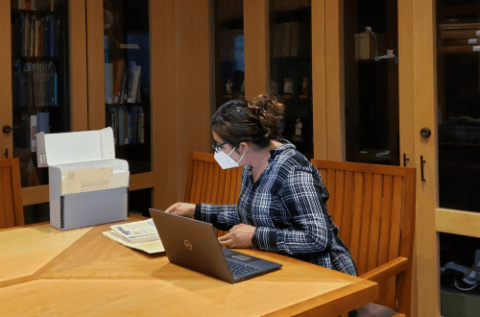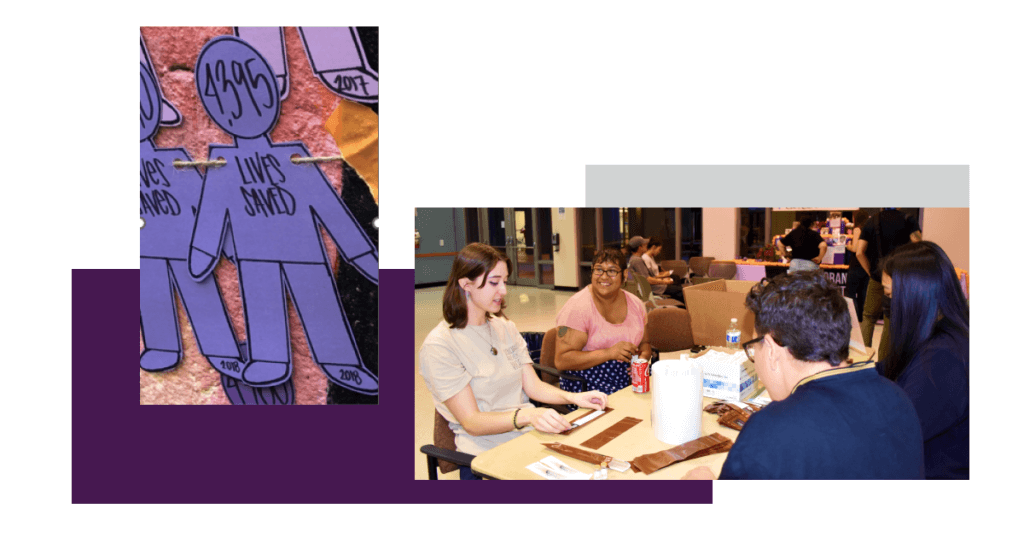The UCSF Library and five community-based partner organizations have received a $97,000 grant from the California State Library to co-create the Opioid Crisis Community Archive (OCCA). This archive, the first of its kind, will document the impact of the opioid crisis on communities and community-based service organizations in Northern California.
The Library Services and Technology Act (LSTA)’s Community Impact Grants allow libraries in California to respond efficiently to local needs and align services with the local communities’ goals. The ongoing opioid overdose crisis is one of the worst public health tragedies in the United States, claiming over a million lives in the last three decades.1 Community-based service organizations have been on the front lines of responding to this crisis since the 1990s and have a deep expertise that merits acknowledgment and preservation. Similarly to HIV/AIDS, the opioid crisis disproportionately impacts structurally marginalized communities, especially in Northern California, where overdose is the leading cause of death for people experiencing homelessness2 and Black and Brown community members are disproportionately impacted by opioid overdose mortality.3 Polina Ilieva, associate university librarian for collections and university archivist at the University of California, San Francisco (UCSF), and co-director of the project, shares, “We are grateful to the California State Library for their support. Preserving and archiving the lived and living experiences of individuals and community-based service organizations impacted by the opioid crisis is necessary to form an inclusive understanding.”
The UCSF Library Archives and Special Collections is uniquely suited for this project, given its collaboration history has enabled open access to materials representing diverse constituencies. One such example is the AIDS History Project, one of the most comprehensive initiatives to document and preserve materials from the HIV/AIDS epidemic. Another is the Opioid Industry Documents Archive (OIDA), a collaboration between UCSF and Johns Hopkins University initiated in 2021 to preserve and provide permanent online public access to millions of internal corporate documents released from opioid litigation and other sources. While OIDA documents illuminate the corporate and business realities of the opioid crisis, the OCCA aims to close the gap of information about the community response. A key output of the OCCA project is the inclusion of underrepresented voices in the historical record to curate the archive.
“The idea for the OCCA was born from a community-identified need to preserve and share the histories of people impacted by the opioid crisis as well as their strength and perseverance despite significant and continuing structural marginalization.”
Kelly Ray Knight, PhD, OCCA project co-director
Empowered partnership
Over the course of a year, the UCSF Library, San Francisco AIDS Foundation, the Homeless Youth Alliance (HYA) of San Francisco, the HIV Education and Prevention Project of Alameda County (HEPPAC), Safer Alternatives through Networking and Education (SANE) in Sacramento, and the Vanguard Lab, a project of the San Francisco Drug Users Union, will partner to co-design the OCCA, which includes collecting primary sources generated by the community-based service organizations related to their advocacy, prevention, harm reduction and other activities to create an inclusive historical record. These organizations serve a diverse range of people impacted by the opioid crisis, including a majority of Black and Brown community members, youth and young adults, people experiencing homelessness, and Californians residing in urban and rural areas.
These organizations are led and staffed by people with lived experience in substance use and opioid use disorder. They have been working for decades to save the lives of the people they serve, advocate for evidence-based policies and programs, and educate the public about the crisis. These organizations are instrumental to the project, and their expertise and lived experience around the opioid crisis in San Francisco and the US will be preserved by this project. “This history tells the story of how we got here, how our organization has survived, and how we survived being homeless ourselves for many years, even as we continued to provide services. It also tells the story of the people who did not survive the opioid crisis and the structural and political forces that contributed to their deaths. Sharing this history with survivors and the larger public is essential.” states Mary Howe, HYA executive director.
The enthusiasm for the project has grown through conversations between UCSF professor, project co-director, and UCSF lead for OIDA research training and community engagement, Kelly Ray Knight, PhD, and the community partner organizations for years. “The idea for the OCCA was born from a community-identified need to preserve and share the histories of people impacted by the opioid crisis as well as their strength and perseverance despite significant and continuing structural marginalization,” Dr. Knight stated. “The collaborative design structure of this project ensures that each unique community creating the archive will lead decision-making about its creation and use.”
“The work produced in this project will benefit our community members directly as they learn from and contemplate this significant component of their shared community history.”
Braunz Courtney, HIV Education and Prevention Project of Alameda County (HEPPAC) executive director
Components of the project
Through their partnership, the UCSF Library and the community-based organizations will convene a community leadership working group to train community members in archival practices and co-develop plans for community education, preservation, and accessibility of records. The records will consist of public education materials (zines and flyers), meeting notes and presentations, community-generated letters in response to public health announcements, photo documentation of pivotal community-based events, including rallies advocating for increased policy response, public testimony, and community memorials resources or experience needed to assess and organize these materials. Braunz Courtney, the executive director of HEPPAC, remarked, “The work produced in this project will benefit our community members directly as they learn from and contemplate this significant component of their shared community history.”
This project kicks off in August 2024. Later on, UCSF Library Archives and Special Collections will be hosting presentations for members of community-based organizations on records management best practices, workshops on interviewing community members, and activities that support creating inclusive spaces and collections.
Through this project’s partnerships and co-design approach, the community-based organizations will frame their history and decide which materials and stories should be collected. Chosen archived materials will also be made freely accessible to the public via the UCSF Library for continued education. The OCCA’s process of community archival co-design will serve as an example that can be referenced or replicated by other community-based organizations addressing public health crises.

Help us preserve these materials
Partners
UCSF Library Archives and Special Collections (ASC) is a dynamic health sciences research center that contributes to innovative scholarship, actively engages users through educational activities, preserves past knowledge, and enables collaborative research experiences to address contemporary challenges. The ASC team is committed to preserving and providing open access to materials representing diverse constituencies.
San Francisco AIDS Foundation was founded in 1982 to respond to the AIDS health crisis. Today, the organization promotes health, wellness, and social justice for communities most impacted by HIV through sexual health and substance use services, advocacy, and community partnerships.
Homeless Youth Alliance (HYA) of San Francisco, California, strives to empower young people experiencing homelessness to protect themselves, educate each other, reduce harm within the community, and when possible to transition off the streets. HYA has been working with and for communities impacted by the opioid crisis and opioid use disorder since 1992.
HIV Education and Prevention Project of Alameda County (HEPPAC) is a Black-led organization whose mission is to stop the spread of HIV and Hepatitis C among people who use drugs and their families and to reduce the impact of drug-related harm in the East Bay Area Alameda and Contra Costa Counties. HEPPAC has been working with and for communities impacted by the opioid crisis and opioid use disorder since 1992.
Safer Alternatives through Networking and Education (SANE) is based in Sacramento, California, serves neighboring rural counties, and promotes quality of life for people who use drugs with a humanistic approach based on harm reduction, respect for human rights, and dignity. SANE has been working with and for communities impacted by the opioid crisis and opioid use disorder since 1993.
The Vanguard Lab, a project of the San Francisco Drug Users Union (SFDUU), is a new harm reduction art and activist hub for creative minds centering BIPOC residents impacted by the war on drugs. Vanguard Lab aims to bring downtown and larger Bay Area communities together to educate, build BIPOC leadership and bring joy through skill building and creative workshops and events. SFDUU provides harm reduction services to homeless and housed residents of the Tenderloin, the neighborhood with the highest rate of opioid-associated overdose in Northern California. SFDUU has been working with and for communities impacted by the opioid crisis and opioid use disorder since 2007.
This project is supported in part by the U.S. Institute of Museum and Library Services under the provisions of the Library Services and Technology Act, administered in California by the State Librarian. It is also supported by the UCSF Library.
Sources
- Spencer, Merianne R.; Miniño, Arialdi M.; Warner, Margaret; Drug Overdose Deaths in the United States, 2002–2022. NCHS Data Brief No. 491, March 2024. https://stacks.cdc.gov/view/cdc/122556
- Cawley C, Kanzaria HK, Zevin B, Doran KM, Kushel M, Raven MC. Mortality Among People Experiencing Homelessness in San Francisco During the COVID-19 Pandemic. JAMA Netw Open. 2022;5(3):e221870. doi:10.1001/jamanetworkopen.2022.1870
- Friedman J, Hansen H, Bluthenthal RN, Harawa N, Jordan A, Beletsky L. Growing racial/ethnic disparities in overdose mortality before and during the COVID-19 pandemic in California. Prev Med. 2021 Dec;153:106845.
Feature image credits
- “Lives saved” by Kelly Knight, Overdose Awareness Day San Francisco, 2017
- “Phoenix Overdose Awareness Day” by Dan Kabella, 2023

